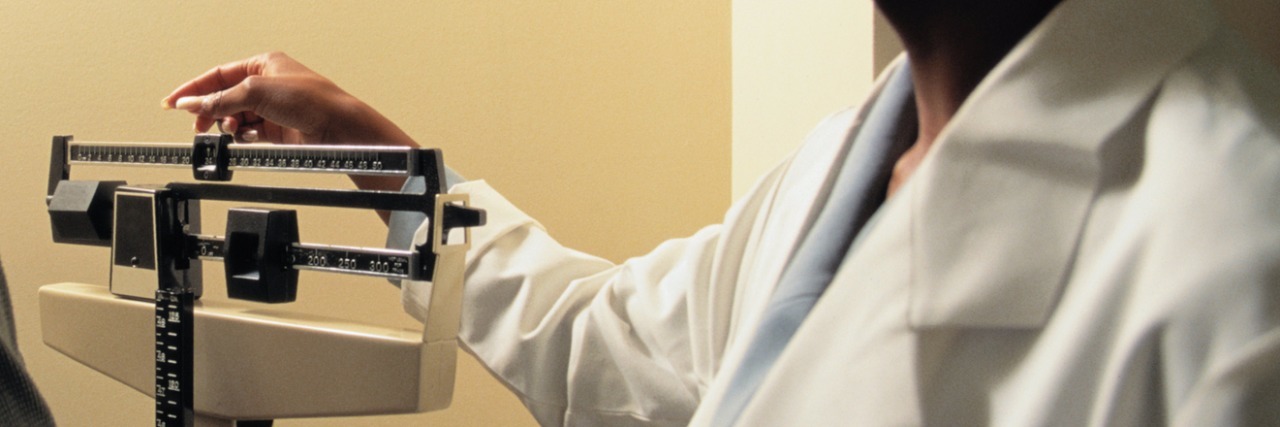When I started my new job in August, I was required to complete a basic physical exam. Upon scheduling my appointment, I already began to feel the apprehension about the upcoming routine weigh-in.
I recalled some of my previous experiences stepping on the scale at a doctor’s office, such as the time when I was receiving treatment for my eating disorder and went for an annual exam at my general practitioner’s office. I was absolutely miserable in my body at this time, evidenced by the showers I avoided or take in the dark so I didn’t have to look at or be present in my body.
I knew my weight had gone up ever since I’d started slowly letting go of my restrictive disordered behaviors regarding food and exercise. I was terrified of seeing that increased number on the scale and wanted to avoid that heart-sinking feeling that would send me deeper into my downward spiral of depression and self-hatred.
“I don’t want to know my weight,” I expressed to the nurse as I stepped on the scale backwards, with the back of my head facing the dreaded number. I was proud of myself for asserting my needs to protect myself. But nothing prepared me for the feeling of humiliation and disappointment when he completely overlooked my request and proceeded to announce the number I didn’t want to hear – the one that left me sobbing to my doctor afterwards. He also did me the honor of telling me how much weight I had gained since my last visit a few months back.
I also remembered the visit where the nurse did not tell me my weight as I had requested. However, at the end of the visit, I was handed a visit summary with that number that held so much power over me.
Situations as such are what make me dread any visit to the doctor. I have been in recovery from my eating disorder for three years now but still have a hard time letting go of the significance of my weight. I still weigh myself at times using my scale at home but not nearly as frequently as I did throughout the depths of my disorder. Thus, the idea of going to the doctor and stepping on a scale other than my own and possibly seeing a number higher than what I’m used to, terrifies me.
On my drive to my recent physical exam, I rehearsed what I wanted to tell the nurse before the weigh-in. I’ve always felt so uncomfortable expressing this need for a “blind” weigh-in and anticipating the person’s confusion and response. If this healthcare professional complied, I took that to mean they agreed with my thoughts that I was heavy and understood why I wouldn’t want to know my “high” weight.
Before I stepped on the scale during my recent visit, I made sure to clearly emphasize my needs: “Please do not tell me what my weight is.” Again, I stepped on the scale backwards so I would be oblivious to the number I still fear. Thankfully, she honored my request.
Although this woman seemed confused, the compassion, respect, and sensitivity she showed me throughout the rest of the visit was incredible. When she had to call the doctor to discuss the results of my physical, she let me know she would have to provide him with my weight and suggested I stand away from the room. At the end of the session, when she usually provides the patients with a treatment summary, one that includes their weight, she warned me about what would be on the paper and said she could throw it away.
I never told this woman I struggled with an eating disorder or about any issues I had with food or with my body image. Nevertheless, she was able to understand and honor, from my request, that the number on the scale clearly has some impact on me that I wanted to avoid. The fact that she continuously took precautions to protect me (and unbeknownst to her, protect my recovery) was so powerful. I appreciated her gestures so much and felt so much respect and admiration for her ability to truly be sensitive and compassionate to my needs as a patient. She may have not understood why this number was so powerful for me, but she wanted to make sure I stayed mentally healthy, and she did. My wish is that other healthcare professionals realize the emotional toll this number can have on individuals, whether or not they have an eating disorder, and practice measures to be more sensitive. To this nurse who was so understanding of my needs, I want to say “thank you.”
If you or someone you know is struggling with an eating disorder, you can call the National Eating Disorders Association Helpline at 1-800-931-2237.
We want to hear your story. Become a Mighty contributor here.
Thinkstock photo by Keith Brofsky

